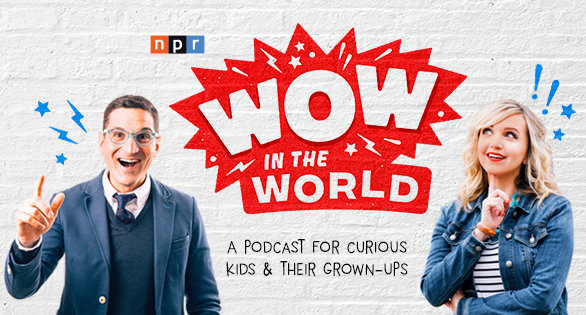
For parents, podcasts have become a viable, much-needed alternative to their kids’ increasing television and smartphone time. And yet, despite the demand among both groups, the number of shows produced for children has remained low relative to all the shows produced for adults.
It’s a void that big producers are starting to fill. NPR is taking the wraps off Wow in the World, it’s first-ever children’s podcast. Created for kids 5 to 12, the show (which premieres May 15) will focus on topics in science and technology, with the goal of sparking conversations among kids and between kids and their parents. Focused on big questions and mysteries (“How long would it take to get to the closest star outside our solar system?”), the show will also feature a heavy emphasis on children’s voices. That’s important, said Mindy Thomas, who hosts the show with former Nieman Fellow Guy Raz, because it emphasizes that the program is designed with kids in mind.
“We want kids to hear other kids’ voices and think, ‘I can do that’ and feel like they are a part of what they’re listening to. It helps them feel more connected,” said Thomas, who hosts the Absolutely Mindy Show on SiriusXM’s Kids Place Live channel. While kids who already have an interest in science will feel a natural draw to the show’s content, Wow in the World is also designed to be compelling to kids bored by the science education they get in school. To win those kids over, Wow in the World has taken narrative lessons from adult shows like Invisibilia and S-Town, which draw listeners in with a big mystery and keep them hooked by making them feel like they’re a part of the stories as they unfold. “We want kids to feel like we’re discovering these things with them. We’re not experts either,” Thomas said.
While Wow in the World is a first for NPR, it’s just the latest addition to the slowly increasing stable of podcasts designed with children in mind — including American Public Media’s science podcast Brains On!, the Vermont Public Radio-produced But Why?, and Australia’s Short & Curly, which focuses on ethics questions. (Poynter last summer offered over a dozen examples.) The success of NPR’s show could help create a larger market for more kid-focused podcasts.
For these shows, producing for kids means creating shows for a highly engaged audience. A survey from Kids Listen, a group that advocates for more high quality podcasts for children, found that 80 percent of 436 families said that their kids listened to individual podcast episodes multiple times — and in 20 percent of cases, more than 10 times. Many parents also said that their kids frequently quoted or reenacted what they heard on shows, shared what they learned with others, and asked questions about the shows’ topics. This interest in producing podcasts for kids seems overdue. “Kids podcasts will go mainstream this year,” Libby Bawcombe, a visual designer at NPR and one of the minds behind Raydiddy, an experimental kids podcast, predicted here at the Lab a few months back. She said that the rising interest in podcasts among adults will naturally trickle down to their kids. It’s a modern variation on how many current NPR listeners started listening to public radio as kids while sitting in the back of their parents’ cars.While interest in kids podcasts is growing among producers and listeners, the medium does still have some challenges, particularly around discovery and monetization. Advertising to children remains tricky, which is why NPR is largely avoiding it with Wow in the World. Instead, the show’s ads will be aimed at parents.
“There’s always that question of who you are supposed to talk to when when you’re advertising in a kids podcast,” Thomas said. “We’re creating something that we want kids and their parents to listen to together, so any ads in the show will be relevant to adults in their lives as parents.”